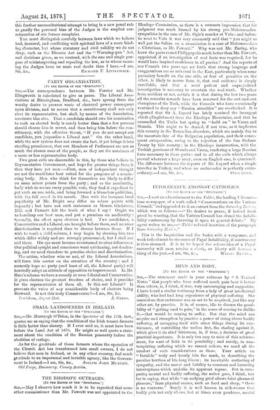PARTY ORGANISATION.
[TO THE EDITOR OF THE "SPECTATOR:'] Sin,—The correspondence between Mr. Forster and Mr. Illingworth is calculated to give us pause. The Liberal Asso- ciations at Birmingham, Bradford, &c., have sprung from the worthy desire to prevent waste of electoral power consequent upon division, and to secure that a constituency shall not only elect its representative, but shall, by means of the Association, nominate him also. That a candidate should owe his nomination to such an elected body is surely better than that a few persons should choose him in secret, and then bring him before the con- stituency, with the effective threat, "If you do not accept our candidate, you jeopardise a Liberal seat." On the other hand, while the new system does not create the fact, it yet brings it into startling prominence, that our Members of Parliament are not so much the chosen ones of the people, as they are the nominees of a more or less representative body.
Two great evils are discernible in this, by those who believe in Representative Government, and hope for greater things from it than they have yet seen :—First, men of independent thought are not the candidates best suited for the purposes of a nomin- ating body. Men who think for themselves are likely to differ on some minor points from the party ; and as the nominating body wish to secure every possible vote, they find it expedient to put such an one aside, and bring forward a blameless politician, with the full creed in his mouth. Men with the immense local popularity of Mr. Bright may differ on minor points with impunity ; but have not such statesmen as Messrs. Gladstone, BIM, and Fawcett felt the truth of what I say ? Ought we to handicap our best men, and put a premium on mediocrity ? Secondly, the effect upon electors is bad. Two candidates, a Conservative and a Liberal, are brought before them, and no nicer discrimination is required than to choose between these. If I wish to teach a child colours, 1 may begin by showing hint two which differ widely and are strongly pronounced, but I shall not end there. His eye must become accustomed to nicer differences. Our political eysight and conscience want quickening, not deaden- ing, and we need therefore to practise choice and discrimination.
The action, whether wise or not, of the Liberal Associations, will force this matter on the attention of the country ; and I earnestly hope no party (and least of all, the Liberal party) will hurriedly adopt an attitude of opposition to improvement. In Mr. Hare's scheme we have a remedy at once Liberal and Conservative. It gives electors the greatest freedom of choice, and it provides for the representation of them all. Is this not Liberal? It prevents the voice of any considerable body of electors being drowned. Is not this truly Conservative ?—I am, Sir, &c.






























 Previous page
Previous page